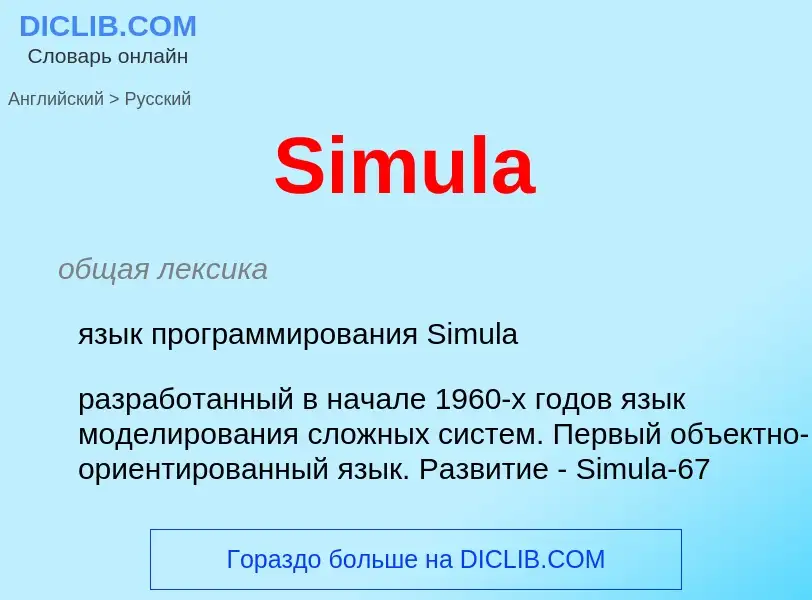Tradução e análise de palavras por inteligência artificial ChatGPT
Nesta página você pode obter uma análise detalhada de uma palavra ou frase, produzida usando a melhor tecnologia de inteligência artificial até o momento:
- como a palavra é usada
- frequência de uso
- é usado com mais frequência na fala oral ou escrita
- opções de tradução de palavras
- exemplos de uso (várias frases com tradução)
- etimologia
Simula - tradução para Inglês
общая лексика
язык программирования Simula
разработанный в начале 1960-х годов язык моделирования сложных систем. Первый объектно-ориентированный язык. Развитие - Simula-67
Смотрите также
общая лексика
[язык] Смолток
его разработали в 1972 г. Алан Кей (Alan Kay) и сотрудники исследовательской группы Software Concept Group фирмы Xerox PARK (США). Первый объектно-ориентированный язык сверхвысокого уровня. Характеризуется интерактивным графическим взаимодействием с пользователем. В нём использованы концепции классов и сообщений из языка Simula-67. В своем развитии язык прошел следующие версии: Smalltalk-72, Smalltalk-74, Smalltalk-76, Smalltalk-78, Smalltalk-80, GNU Smalltalk, Smalltalk/V
дословная передача
"короткий разговор"
Смотрите также
Definição
Wikipédia
Simula is the name of two simulation programming languages, Simula I and Simula 67, developed in the 1960s at the Norwegian Computing Center in Oslo, by Ole-Johan Dahl and Kristen Nygaard. Syntactically, it is an approximate superset of ALGOL 60,: 1.3.1 and was also influenced by the design of Simscript.
Simula 67 introduced objects,: 2, 5.3 classes,: 1.3.3, 2 inheritance and subclasses,: 2.2.1 virtual procedures,: 2.2.3 coroutines,: 9.2 and discrete event simulation,: 14.2 and featured garbage collection.: 9.1 Other forms of subtyping (besides inheriting subclasses) were introduced in Simula derivatives.
Simula is considered the first object-oriented programming language. As its name suggests, the first Simula version by 1962 was designed for doing simulations; Simula 67 though was designed to be a general-purpose programming language and provided the framework for many of the features of object-oriented languages today.
Simula has been used in a wide range of applications such as simulating very-large-scale integration (VLSI) designs, process modeling, communication protocols, algorithms, and other applications such as typesetting, computer graphics, and education. The influence of Simula is often understated, and Simula-type objects are reimplemented in C++, Object Pascal, Java, C#, and many other languages. Computer scientists such as Bjarne Stroustrup, creator of C++, and James Gosling, creator of Java, have acknowledged Simula as a major influence.


